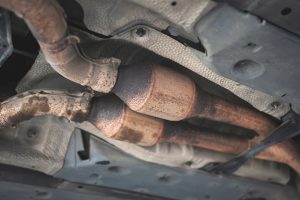
You might have noticed a drop in your Lincoln’s ordinarily flawless engine function and handling. Perhaps this was accompanied by an unpleasant sulfury smell and a rattling sound from below. These odd phenomena could be signs of a faulty catalytic converter. Let’s look in detail at three indications that your cat is in trouble, so you know when to visit your Lincoln dealer to have it fixed or replaced.
Your Engine’s Clearly Struggling
A malfunctioning converter starts to inhibit the exit of air and fumes from your exhaust system. This backs up the flow of air throughout the engine, which means the combustion chambers aren’t getting enough fresh oxygen. As a result, you’ll experience a variety of engine problems.
Reduced Acceleration
When you press on the gas pedal, you might notice you’re not speeding up anywhere near as quickly as you should be. This is dangerous when you need a burst of speed such as while overtaking.
Rough Starting and Idling
The cylinders of an oxygen-starved engine won’t be firing as consistently. This means they’re misfiring. In this case, you’ll notice your engine sputtering and juddering when you start it up and also while idling. A misfiring engine will also lose RPMs unexpectedly.
Black Exhaust Smoke
With less air entering the combustion chambers, the delicate balance of fuel and oxygen is thrown off. To compensate, the engine will often inject excess fuel, some of which will go unburned. This excess unburned fuel might start escaping out of your tailpipe. If this happens, you’ll see thick black smoke in your rearview mirror.
You Can Smell Rotten Eggs
One of the toxic emissions a healthy cat cleans up is hydrogen sulfide. This particular gas has an awful sulfury smell, rather like that of rotten eggs. If you can smell eggs in your cabin, roll down all the windows and drive your car straight to a dealership. Hydrogen sulfide is a very dangerous gas to breathe.
You Hear Metallic Rattling From Below
A damaged cat often causes a loud rattling sound. If the converter is jolted loose in its brackets, it will shake around, making a noise. This problem can often be fixed quite easily by screwing and welding the brackets back into place.
But if the internal mesh workings of the cat have been broken by a jolt or denting blow, then you’ll probably need a new converter. The rattling sound in this situation is loose pieces of metal mesh bouncing around.
How Your Lincoln Dealer Tests a Cat
You can look under your car and visually inspect your own cat for dents of looseness. Other than that, it’s tricky for most drivers to know for sure if their cat is damaged or malfunctioning.
A technician at your local dealership can use a back-pressure gauge to find any buildups of pressure that result from a broken cat. They can also use a pyrometer to check the exhaust’s temperature before and after the cat. This will usually identify any internal cat problems.
Have your cat inspected, repaired, or replaced today at Bob Maxey Lincoln. We’ve been serving the drivers of Detroit and the surrounding region since 1972.





